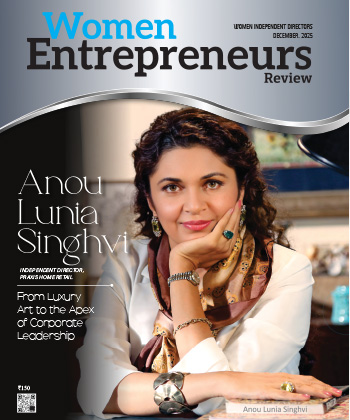
India is on the Verge of a 'Flexidus,' with Many Women Quitting Jobs Owing to a Lack of Flexibility: LinkedIn
By: WE Staff | Wednesday, 13 April 2022
LinkedIn, the leading online professional network, released its latest consumer research on Tuesday, based on 2,266 respondents in India, to identify the problems women face at work.
According to the study, employers' attitudes regarding flexible working and career breaks are preventing women from requesting more flexibility and re-entering the workforce.
According to LinkedIn's research, 8 out of 10 working women (83%) have realised they want to work more flexibly as a result of the pandemic's impact.
According to the study, 72% of working women reject employment that don't enable them to work flexibly, and 70% have already quit or are considering resigning because they weren't given the right flexible policies.
When asked about the advantages of flexible working, nearly two-fifths of women said it enhances their work-life balance and helps them advance in their professions, while one-third said it improves their mental health and makes them more likely to stay in their current jobs.
However, due to strong employer bias, India's working women are paying a high price for working flexibly, according to the report, with 9 out of 10 working women having to take a pay cut, 2 out of 5 having their flexible working request denied, and 1 out of 4 struggling to persuade their bosses to accept their request.
According to the study, women are hesitant to ask for more flexibility because they are afraid of being excluded, being held back from advancements, working extra, taking pay cuts, and being perceived unfavourably by their superiors.
"Flexible working is the top priority for all professionals today, particularly working women." In fact, according to our research, India is on the verge of a 'flexidus,' with seven out of ten working women departing or considering quitting due to a lack of flexibility.
"If employers and recruiters don't want to lose top talent, they must erase the stigma surrounding the need for flexibility and career pauses, and establish better flexibility policies," said Ruchee Anand, Senior Director, India Talent & Learning Solutions, LinkedIn.
Despite the benefits of sabbaticals, nearly four out of five (77%) working women in India who took one feel it harmed their careers. This is owing to the widespread stigma that exists among recruiters and employers regarding career pauses.
LinkedIn is introducing 'Career Breaks,' a new feature that allows individuals to add a career break to their LinkedIn profile and demonstrate how they may apply their learnings to professions they are interested in.
''This feature will de-stigmatise resume gaps as part of our professional journeys, and empower women to better communicate their unique experiences to their connections and recruiters,'' Anand said.
Most Viewed
- 1 Women's Health Startup HerMD Closing Doors Amid Industry Challenges
- 2 5 Famous Women in Indian Armed Forces
- 3 Saudi Women No longer Require Male Permission for Clothing Choices, says Prince MbS
- 4 Kolkata Medtech Startup Innovodigm Raises Rs 5.5 Crore Seed Funding Led by IAN Group
- 5 Yamunanagar's Kashish Kalra Honoured after Securing 111th Rank in UPSC Civil Services Exam
- 6 Madurai Appoints Its First Woman Corporation Head
- 7 IAS Vijayalakshmi Bidari Appointed as the new Nagpur Divisional Commissioner
- 8 American Entrepreneur Lucy Guo Overtakes T Swift to become Youngest Female Billionaire
- 9 ICC Women's World Cup 2025 Trophy Showcased at Indore's Holkar Stadium
- 10 Aparna Saxena's Beauty Venture AntiNorm Launches in India
- 11 Vidya Nataraj Co-Founded BlueStone Jewellery & Lifestyle files IPO
- 12 5 Women Freedom Fighters of India
- 13 Dr. G Krishnapriya appointed as CEO for Trichy
- 14 M3M & Sirona Partner to Introduce Menstrual Hygiene Vending Machines in 15 Locations
- 15 Punjab Govt launches SHE Cohort 3.0 Supporting Tech-led Women Startups
- 16 Indian origin Lawyer, Sweena Pannu appointed as the US New Superior Court Judge
- 17 The Aurora Tech Award recognizes 4 Indian Women-led Startups
- 18 Kerala's Republic Day parade featured an all-female tableau
- 19 Manisha Kabbur Becomes Karnataka's First Woman International Karate Coach
- 20 Director K. S. Ravikumar's Daughter Maalica Ravikumar Launches Life Coaching Company 'Evergrowth Academy' for Women
- 21 Leezu's Raises Pre-Seed Funding to Accelerate Growth in Sexual Wellness Industry
- 22 Sattu: Super-easy summer drink for PCOS gut healing
- 23 Swathi Nelabhatla creates Sitha App, India's First Women-Exclusive Gig Platform
- 24 7 Timeless Female Kathak Dancers & their Iconic Legacies
- 25 Meet 7 Iconic Women Architects of Modern India & their Most Impactful Work
- 26 This Woman-led Insuretech Startup is Helping Bridge the Education Financing Gap in India
- 27 Women Leaders Share Lessons Learnt from India Women's WC Win
- 28 5 Enterprising Women Founders Powering Singapore's Tech & Innovation Landscape
- 29 4 Women. 4 Stories. One Vision for Smarter, Stronger Healthcare
- 30 Global Gender Gap Narrows to 68.8%, But Full Equality 123 Years Away: WEF Report 2025
- 31 Changemakers: 7 Women Entrepreneurs Taking the Make in India Movement Forward
- 32 Meet Lucy Guo, The Youngest Self-Made Female Billionaire Disrupting Tech
- 33 How Women are Driving India's Festive Online Shopping Surge






